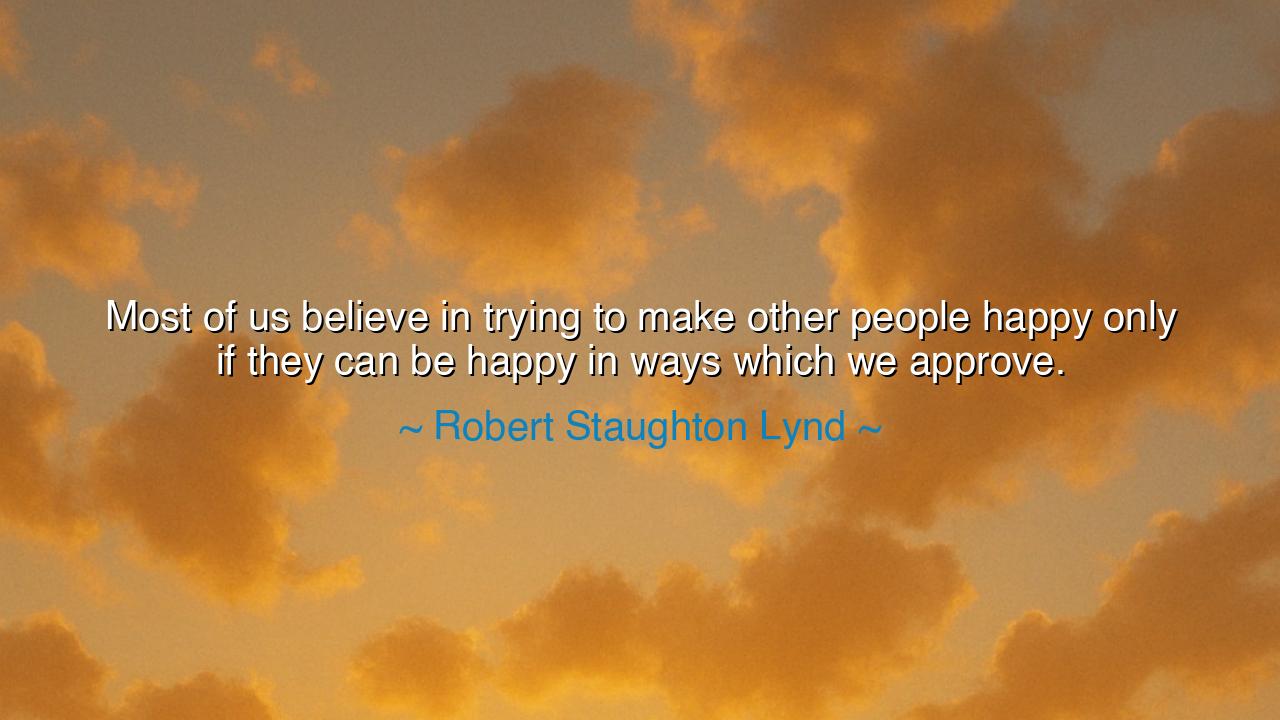
Most of us believe in trying to make other people happy only if
Most of us believe in trying to make other people happy only if they can be happy in ways which we approve.






In his quiet yet piercing wisdom, Robert Staughton Lynd, a sociologist and thinker of the human condition, once observed: “Most of us believe in trying to make other people happy only if they can be happy in ways which we approve.” In this single sentence, he unmasks one of the oldest and most subtle forms of self-deception — the idea that we are benevolent, when in truth our benevolence is bound by our own pride. Lynd reveals that the limits we set upon others’ happiness are often the limits of our own understanding. We wish to do good, but only according to our terms; we wish others joy, but only if it resembles the kind we recognize. And so, beneath the appearance of generosity, hides the shadow of control.
The origin of this insight lies in Lynd’s study of ordinary lives — in how people build families, communities, and societies. He saw that even those who speak of kindness and virtue often mistake approval for compassion. The parent who forces the child into a “respectable” life, the ruler who demands obedience for the sake of order, the friend who cannot accept another’s different path — all believe they act out of love or wisdom, yet what they truly defend is the comfort of their own beliefs. Lynd’s words are both a mirror and a warning: beware the impulse to shape others in your image, for in doing so, you love not them, but only a reflection of yourself.
To understand this truth, let us look to a story from the life of Galileo Galilei, the great astronomer. When he revealed that the Earth moves around the Sun, the world turned against him. The Church, believing itself the guardian of truth and the happiness of souls, declared his discovery dangerous. They sought not his destruction, but his “correction” — to make him conform, to silence him “for his own good” and for the good of mankind. Yet in their zeal to preserve what they called order and virtue, they extinguished freedom of thought. This is what Lynd warns us of: when we mistake domination for kindness, we turn even love into a chain.
In truth, happiness is not a single road, but a thousand winding paths, each leading through different valleys of experience. What brings peace to one heart may bring restlessness to another. The artist finds joy in creation; the soldier in duty; the hermit in silence; the mother in her child’s laughter. To deny another the right to pursue their own way of joy is to deny the sacred diversity of the human spirit. The wise do not demand that others live as they would; they rejoice that each soul has its own song to sing. For just as no two stars shine with the same light, no two hearts are meant to find happiness in the same way.
Yet, this truth is difficult for most to accept, for the ego clings fiercely to its sense of being right. It whispers, “If they would only think as I do, live as I live, believe as I believe — then they would be happy.” But such thinking is not love; it is vanity disguised as virtue. True love, true compassion, is the courage to allow others to walk their own path, even when it leads away from ours. To love someone is not to direct their steps, but to stand beside them with understanding, trusting that the divine spark within them will guide them to their own fulfillment.
There is a simple yet profound lesson here: to truly wish for another’s happiness is to release control over what form that happiness takes. The friend who listens without judgment, the teacher who encourages without imposing, the parent who allows their child to dream beyond tradition — these are the true benefactors of humanity. They know that the light of joy burns brightest when it is freely kindled. Those who try to command the happiness of others soon find they have quenched the flame altogether.
So, my child, let this wisdom guide your heart: when you say, “I want you to be happy,” ask yourself — do you mean it, or do you mean, “I want you to be like me”? Learn to rejoice in the difference of others, for that is the soil from which love grows. Practice the art of compassion that does not demand conformity, of care that does not require obedience. Let your goodwill be as the sun — shining upon all, without choosing who is worthy to receive its light. For in the end, the measure of our virtue is not in how many people we have made like ourselves, but in how many we have set free to be themselves — and thus, to be truly happy.






AAdministratorAdministrator
Welcome, honored guests. Please leave a comment, we will respond soon